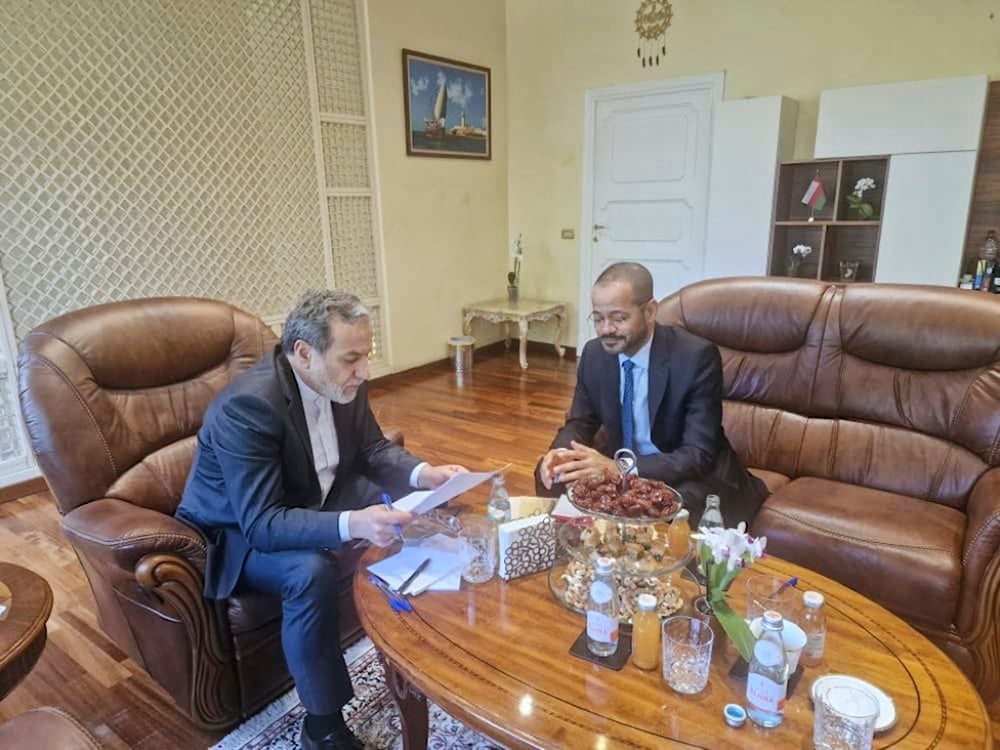Iran-US talks in Rome yield limited progress, Omani FM says
Partial progress marks the Iran-US nuclear talks in Rome as Tehran insists enrichment remains non-negotiable.
-

Iranian Foreign Minister Abbas Araghchi, left, reads a paper in a meeting with his Omani counterpart Sayyid Badr Albusaidi at the Omani Embassy in Rome during the fifth round of Iran-US negotiations, Friday, May 23, 2025 (Iran Foreign Ministry)
The fifth round of indirect talks between Iran and the United States concluded in Rome with cautious optimism but no decisive breakthrough, according to statements by Omani Foreign Minister Badr al-Busaidi, who is mediating the process.
“We achieved some progress, although it was not conclusive,” al-Busaidi said during a press briefing at the end of the talks. He expressed hope that “outstanding issues can be clarified in the coming days in a way that allows for meaningful progress toward a sustainable agreement.”
The fifth round of Iran US talks have concluded today in Rome with some but not conclusive progress. We hope to clarify the remaining issues in the coming days, to allow us to proceed towards the common goal of reaching a sustainable and honourable agreement.
— Badr Albusaidi - بدر البوسعيدي (@badralbusaidi) May 23, 2025
The talks, held behind closed doors at the headquarters of Oman’s diplomatic mission in the Italian capital, lasted three and a half hours, according to Al Mayadeen’s correspondent in Rome.
The session saw the early departure of the US special envoy, Steve Witkoff, which raised questions about Washington’s posture in the talks. However, the continued presence of the American technical delegation was viewed as a positive sign. “The fact that the technical team remained is an encouraging indication,” Al Mayadeen’s correspondent noted.
'Israel' influencing US positions
A spokesperson for Iran’s Foreign Ministry confirmed that the technical talks “were conducted in a professional and calm atmosphere,” suggesting that the dialogue remained constructive despite political tensions.
According to an Axios report, Witkoff had met earlier in the day with Israeli Strategic Affairs Minister Ron Dermer and Mossad chief David Barnea in Rome to coordinate positions ahead of the Iran talks.
The revelation of this meeting has sparked concerns about the degree of "Israel’s" influence on US positions in the talks, particularly as the Iranian side has repeatedly insisted that the discussions focus on achieving a sovereign, balanced outcome free of external interference.
Iran vows retaliation for Israeli nuclear threats
Amid the Iran-US talks, US media reports citing intelligence suggest "Israel" may be preparing a military strike on Iranian nuclear sites, with CNN reporting that American officials have warned such action could not only represent a dangerous break from previous US policy but also risk triggering a broader regional conflict.
In a formal letter to the United Nations, Iranian Foreign Minister Abbas Araghchi delivered a stern warning regarding potential Israeli attacks on Iran’s nuclear facilities, declaring that Tehran would respond decisively to any such aggression while explicitly stating that the United States would bear legal responsibility for any resulting escalation.
Araghchi emphasized that in the event of such a strike occurring, the United States would bear unavoidable responsibility, arguing that Washington's consistent political and military backing of "Israel" establishes clear complicity in any potential aggressive actions.
Echoing the foreign ministry's position, the Iranian Parliament simultaneously reinforced Tehran's unwavering stance on preserving its nuclear rights as lawmakers emphasized the nation's continued adherence to the Treaty on the Non-Proliferation of Nuclear Weapons (NPT) and its consistent rejection of nuclear weapons development.

 3 Min Read
3 Min Read









